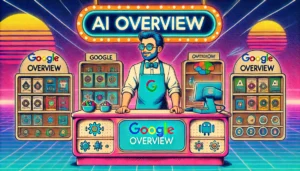How Is AI Decreasing Your Website Traffic?
If your website traffic is slipping despite your best SEO efforts, you’re not alone. The rise of AI-powered search tools like ChatGPT and Google Gemini is reshaping the digital landscape, forcing businesses to rethink their strategies. Here’s why it’s happening and how you can adapt to stay ahead.
If you’re noticing a decline in your website traffic compared to last year, despite your efforts to improve SEO, then you’re not alone.
It was only a matter of time before the general consumer would find that searching in ChatGPT is much more convenient than searching in Google. In fact, the experience is so convenient that Google is doing their own “AI Overview” which gives a summarized answer without any need to click on the websites where the answers came from.
Initially people will think, “Well that’s unfair! Our effort, our content, and yet only Google and ChatGPT benefits?”
Unfortunately this is the harsh reality. Google and ChatGPT will only care about giving the most pleasant experience for the user and they will not hesitate to move forward without due consideration for your website.
The Rise of AI in Search
To begin understanding why your traffic is decreasing, we need to clarify that this is for websites that relied on traffic coming from Google search. Google search used to be the number one place to find answers but lately, that has started to diversify into other channels like Tiktok, Amazon, and other apps that provide content.
For our focus today, we will cover specifically, traffic loss from search engines due to the rise of AI in search. Let’s look into what’s going on with Search traffic behavior shift:
- AI-Powered Direct Answers AI technologies like Google’s Featured Snippets, Knowledge Panels, and AI-driven summaries provide users with immediate answers directly on the search engine results page (SERP). These features reduce the need for users to click through to websites, as their questions are often answered without visiting external pages.
- Generative AI in Search Engines Platforms like ChatGPT, Bing AI, and Google Gemini deliver comprehensive responses that aggregate information from multiple sources. These tools provide conversational and context-rich answers, bypassing the need for users to explore individual websites.
- Voice Search Optimization Voice assistants like Siri, Alexa, and Google Assistant rely on AI to extract information from websites, delivering concise answers audibly. This reduces traffic to the original sources since users rarely need to visit the webpage.
- Content Aggregation and Personalization AI tools curate and aggregate content based on user preferences, creating personalized feeds that eliminate the necessity of exploring multiple websites. Users receive highly tailored results within a single interface, reducing exposure to other online sources.
- Decreased Importance of Traditional SEO Traditional SEO strategies, once the cornerstone of driving website traffic, are being outpaced by AI’s ability to understand user intent more deeply and provide direct solutions. AI also prioritizes quality, relevance, and authority, which may penalize sites that do not continuously meet evolving content standards.
Reasons Behind AI’s “Eating” of Website Traffic
To understand why AI is affecting website traffic, it’s essential to break down the mechanisms that enable this shift:
- Shift from Clicks to Answers AI-driven SERP features are designed to satisfy user intent without requiring additional clicks. This leads to fewer visitors reaching the websites that supply the data for these answers.
- AI as a Middleman AI-powered tools extract and summarize data from multiple sources, providing consolidated answers. While this benefits users by saving time, it redirects traffic from individual websites to AI tools.
- Increased Competition Websites are no longer just competing with other websites; they’re competing with AI models that gather data from the entire internet. This competition reduces visibility for smaller or niche websites who heavily rely on search engines for traffic.
- User Behavior Changes With AI offering faster, more personalized results, users are less likely to browse multiple pages. This behavior diminishes the likelihood of them reaching your website organically.
- Data Monetization by AI Platforms AI companies leverage the data scraped from websites to enhance their tools and generate revenue, often without driving reciprocal traffic back to the original source.
Action Plans to Combat the Impact of AI on Website Traffic
Despite these challenges, businesses can adopt strategies to adapt to the changing digital landscape and retain website traffic.
1. Optimize for AI Search and Voice Queries
- Focus on Featured Snippets: Ensure your content is structured in a way that answers common questions clearly. Use headers, bullet points, and concise summaries.
- Target Long-Tail Keywords: These are more conversational and align with how users ask questions via AI tools or voice search.
- Schema Markup: Implement structured data to help search engines understand your content better and improve its chances of being featured in SERPs.
Wait, aren’t we supposed to compete with AI instead of making it easier for them to index our content? Well, yes and no. You need to compete in terms of providing value to your readers so they directly go to your website, but you need to make AI acknowledge your authority so you control the narrative with content.
2. Build a Knowledgebase
AI tools thrive on high-quality, organized information. Creating a comprehensive knowledgebase can help your website become a go-to source for data aggregation not just for AI bots, but for actual human readers.
- Use FAQs and How-To guides.
- Create evergreen content that AI can pull data from.
- Gate your content, create a way to get only human readers accessing your most valuable content (email capture forms to access the content)
3. Focus on Brand Authority
- Content Depth: Publish authoritative and in-depth content to become a trusted resource that AI platforms reference.
- Social Proof: Showcase customer reviews, testimonials, and case studies to establish credibility.
- Networking: Collaborate with influencers or authoritative figures in your niche to boost brand recognition.
More than ever, to compete with AI you need to get creative with diversifying your traffic sources. Don’t put all your eggs in one basket (like Google search).
4. Enhance User Engagement
As of the moment, AI can only provide general information and sometimes even inaccurate information. When people look for some very niche information such as a quotation for a service, or a project plan for a particular service (like landscaping or house repair) then they need real businesses communicating accurate information.
Instead of writing those accurate information for AI to grab, create engaging ways for readers to get that information.
- Interactive Features: Add tools like quizzes, calculators, or dynamic infographics to make your website more engaging.
- Personalized Content: Use AI to analyze visitor data and provide personalized content recommendations. (yes use your “enemy” to win this battle)
- Foster Community: Build forums, comment sections, or discussion boards to encourage user interaction. AI does not have the capability to create communities. Real human interaction is not easily replaced.
5. Leverage AI to Your Advantage
- Use AI-powered tools to optimize your content strategy, keyword research, and analytics.
- Develop chatbots for your website that keep users engaged by answering questions and guiding them through your services.
- Analyze AI-generated data on user behavior to improve your site’s design and user experience.
If you’re a bit hesitant to use AI because of how complex it might be or it’s not giving you the results you need, try OneClickAI.pro, it’s preloaded with AI assistants so you don’t need to figure out what to type to get you going!
6. Diversify Traffic Sources
Remember what I said about eggs in one basket? The internet has several sources of traffic. You just need to be aware of where your customers are and engage with them on those platforms!
- Focus on other channels like social media, email marketing, and paid advertisements to reduce dependence on search engines.
- Create video content for platforms like YouTube or TikTok, where AI tools cannot extract direct content as easily.
7. Monitor and Adapt
If you’re not measuring then you’re missing out. All that valuable data in your analytics (while you still have traffic) is meant to tell you about what works and what doesn’t work in your website. \
You go beyond assumptions of what your readers need and actually see how people are engaging with your existing content.
- Regularly review traffic analytics to identify changes in visitor behavior.
- Stay informed about updates to AI tools and search engine algorithms.
- Test and iterate new content strategies to find what resonates most with your audience.
AI Is The Future Whether You Like It Or Not
AI’s growing influence on search and user behavior presents a double-edged sword for businesses. While it challenges traditional website traffic strategies, it also opens doors to innovate and adapt. Through your understanding of how AI impacts your site and implementing the right counter-strategies, you can mitigate traffic losses and turn AI into a valuable asset for your business.
The key lies in staying proactive: adapt your content, leverage technology, and focus on building a strong brand presence. As the digital landscape continues to evolve, those who embrace change will thrive while others struggle to keep up.
Adapt or get left behind.
Need to know how your business website should adapt for an AI-fueled future?
Contact us!








